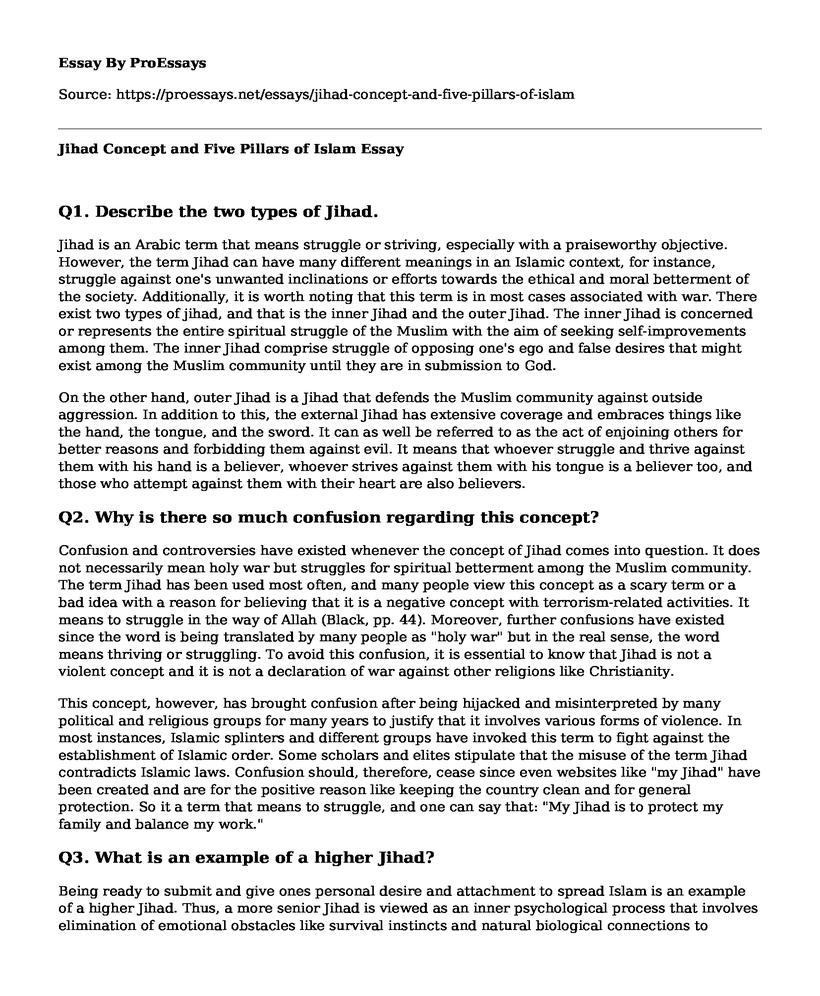Q1. Describe the two types of Jihad.
Jihad is an Arabic term that means struggle or striving, especially with a praiseworthy objective. However, the term Jihad can have many different meanings in an Islamic context, for instance, struggle against one's unwanted inclinations or efforts towards the ethical and moral betterment of the society. Additionally, it is worth noting that this term is in most cases associated with war. There exist two types of jihad, and that is the inner Jihad and the outer Jihad. The inner Jihad is concerned or represents the entire spiritual struggle of the Muslim with the aim of seeking self-improvements among them. The inner Jihad comprise struggle of opposing one's ego and false desires that might exist among the Muslim community until they are in submission to God.
On the other hand, outer Jihad is a Jihad that defends the Muslim community against outside aggression. In addition to this, the external Jihad has extensive coverage and embraces things like the hand, the tongue, and the sword. It can as well be referred to as the act of enjoining others for better reasons and forbidding them against evil. It means that whoever struggle and thrive against them with his hand is a believer, whoever strives against them with his tongue is a believer too, and those who attempt against them with their heart are also believers.
Q2. Why is there so much confusion regarding this concept?
Confusion and controversies have existed whenever the concept of Jihad comes into question. It does not necessarily mean holy war but struggles for spiritual betterment among the Muslim community. The term Jihad has been used most often, and many people view this concept as a scary term or a bad idea with a reason for believing that it is a negative concept with terrorism-related activities. It means to struggle in the way of Allah (Black, pp. 44). Moreover, further confusions have existed since the word is being translated by many people as "holy war" but in the real sense, the word means thriving or struggling. To avoid this confusion, it is essential to know that Jihad is not a violent concept and it is not a declaration of war against other religions like Christianity.
This concept, however, has brought confusion after being hijacked and misinterpreted by many political and religious groups for many years to justify that it involves various forms of violence. In most instances, Islamic splinters and different groups have invoked this term to fight against the establishment of Islamic order. Some scholars and elites stipulate that the misuse of the term Jihad contradicts Islamic laws. Confusion should, therefore, cease since even websites like "my Jihad" have been created and are for the positive reason like keeping the country clean and for general protection. So it a term that means to struggle, and one can say that: "My Jihad is to protect my family and balance my work."
Q3. What is an example of a higher Jihad?
Being ready to submit and give ones personal desire and attachment to spread Islam is an example of a higher Jihad. Thus, a more senior Jihad is viewed as an inner psychological process that involves elimination of emotional obstacles like survival instincts and natural biological connections to spouse, offspring and a safe dwelling which will make the believer ready and willing to submit everything unto Allah.
Moreover, higher Jihad involves the replacement of personal and individual desires with an absolute loyalty towards the prophets of Allah and his laws. Both the Quran and Muhammed states several times how it is crucial it is for the Muslim to be ready and willing to give everything that is in their possession and even their lives to wage Jihad for Allah. The Quran goes further to label those individuals who are not willing to give up their family and everything they have for the sake of Jihad as disobedience.
Q4. List five pillars of Islam and point out which one you believe is most important.
The five pillars include:
- Confession
- Daily prayer
- Giving
- Fasting
Pilgrimage to Mecca
I believe confession is the most important of all the five pillars since it encompasses all the other four pillars. For instance, if one wishes to confess, he will have to have daily prayers, give some percentage of an offering, fast and offer pilgrimage to Mecca. During confession, Muslims believe there is no other God but Allah and Muhammad his last prophet. Moreover, under this pillar, all other duties and obligations are incorporated, for to believe that Muhammad and Allah are to be obeyed regarding their teachings and their law (Cara & Zulkifli, pg. 84). This pillar also is crucial because it involves sincerely reciting the Muslim undertakings of faith during confession.
Confession must be based on a firm and sincere belief from the heart of the believer as well as showing verbal expression. Finally, this pillar is crucial since it has some benefits including involving total surrender to the will of Allah and agreeing to become his faithful servant.
Works Cited
Black, Ian. Ball of Confusion. , 2015. Print
Cara, Anwar, and Azhari Zulkifli. 5 Pillars of Islam. , 2014. Print.
Cite this page
Jihad Concept and Five Pillars of Islam. (2022, Mar 29). Retrieved from https://proessays.net/essays/jihad-concept-and-five-pillars-of-islam
If you are the original author of this essay and no longer wish to have it published on the ProEssays website, please click below to request its removal:
- Notable Contributions to Christianity - Religion Essay Example
- Paper Example on Importance of Learning How to Be a Follower
- Assignment Example on Teaching of Jesus
- The Idea of God in Christianity Orthodox in the USA - Paper Example
- Reflection Essay Sample on the Treatment of Women in Islam
- Essay Example on Al-Ghazalli & Mawdudi: Cohabitation Imperative & Qur'an
- Essay Example on Christianity: Shaping Culture with Purpose and Intent







